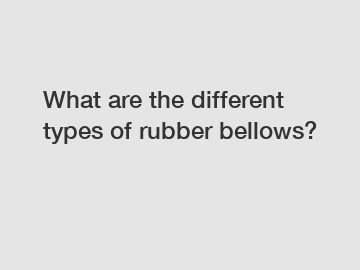What are the different types of rubber bellows?
Rubber bellows are versatile components used in various industries for different applications. These flexible seals are designed to absorb thermal expansion, reduce vibration, and maintain a sealed environment. With their ability to accommodate axial, lateral, and angular movements, they are crucial in ensuring the longevity and effectiveness of various systems. Let's take a closer look at the different types of rubber bellows available in the market and their applications.
1. Molded Rubber Bellows.
Molded rubber bellows are the most common type of bellows used in various industries. They are manufactured by molding rubber compounds into the desired shape and size. These bellows are known for their durability, high flexibility, and resistance to abrasion, chemicals, and UV radiation. Molded rubber bellows find applications in automotive, HVAC systems, aerospace, and many other industries.

2. Fabric Expansion Joints.
Fabric expansion joints, also known as fabric bellows, are made using layers of heat-resistant fabric sandwiched between rubber layers. These bellows are designed to accommodate large movements in piping systems due to thermal expansion and vibration. Fabric expansion joints are well-suited for high-temperature environments found in power generation plants, exhaust systems, and industrial processes.
3. PTFE Bellows.
PTFE (polytetrafluoroethylene) bellows are widely used in industries where chemical resistance is essential. These bellows are made from PTFE, a material known for its excellent chemical resistance, low friction properties, and high temperature resistance. PTFE bellows are typically used in chemical processing plants, pharmaceutical industries, and food processing applications.
4. Metal Bellows.
Metal bellows are highly effective in applications where temperature, pressure, and mechanical variables are extreme. These bellows are usually made from stainless steel, nickel alloys, or other high-strength metals. Metal bellows can withstand high pressures, corrosion, and extreme temperatures. They are commonly used in aerospace, oil and gas, and nuclear engineering industries.
5. Silicone Bellows.
Silicone bellows are widely used in industries that require resistance to extreme temperatures and environmental conditions. Silicone rubber has excellent thermal stability, electrical insulation properties, and resistance to UV radiation and ozone. These bellows are commonly used in automotive, aerospace, and electrical industries.
6. Tapered Bellows.
Tapered bellows, as the name suggests, have a gradually changing diameter along their length. This design allows for smooth transition and flexibility in applications where space is limited or movement is restricted. Tapered bellows are commonly used in medical devices, optical equipment, and precision machinery.
In conclusion, rubber bellows play a crucial role in various industries by providing flexibility, protection, and sealing capabilities. From molded rubber bellows to metal bellows, each type offers unique properties that suit different applications. It is essential to select the right type of rubber bellow based on the specific requirements of your project.
If you are looking for high-quality rubber bellows tailored to your needs, please do not hesitate to contact us. Our team of experts will be happy to assist you in finding the best solution for your application.
Contact us to discuss your requirements of square rubber gaskets, o-ring color dots, special shape rubber supplier. Our experienced sales team can help you identify the options that best suit your needs.


